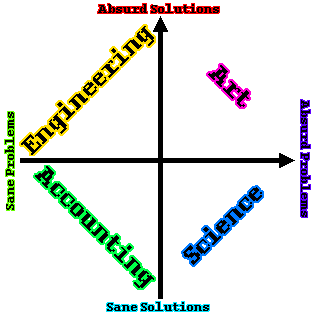The AESA Model
People sometimes seem to disagree about whether various fields are "an art" or "a science" or a mixture of both. Moreover this seems to be a very vibes-y delineation within which most folks can't give a satisfying definition of either pole. Some "sciences", like applied chemistry, certainly have many of the hallmarks of art, while many arts, like the experimental fringes of music, are fiercely scientific. Then there are human pursuits which smack of neither science nor art, and so a careful observer, interested in the vagaries of language, may be tempted to ask: "What gives? What is any of this actually pointing at?" Here's an attempt at an answer. Human pursuits are very abstractly problem solving. Humans perform actions because they consciously or subconsciously desire some outcome and because they do not believe that this outcome would come about without their input. Congratulations, we have rediscovered intelligence as the property of systems to steer the world away from likely, quotidian state-space. Local extropy production etc etc (ask Land about the details). Stripping it down like this leaves us exactly two variables to work with: "What are the goals/problems?" and "What are the actions taken?" There are two relevant spectra here. "Problems from sane and simple to complex and absurd" and "Solutions also from sane and simple to complex and absurd". One might intuitively believe that simplicity begets simplicity and complexity complexity, but this is far from consistently the case. Still, let's start with a well-behaved example: The solution to the sane, simple problem of "a thing being dirty" is oftentimes the sane, simple act of pouring water over it. The solution to hunger is to pick an apple, or to buy one. This is very clearly not the domain of either art or science and rather what I would refer to as "accounting". Most chores are accounting, but like with our previous exceptions not all literal "accounting" is accounting. There are fringes to the field which are neither simple nor sane, but the term works fine enough to convey the general idea of "everyday problems that can be solved by a short decision algorithm and a spreadsheet". Science also gives us short decision algorithms and spreadsheets a lot of the time, but they aren't the solutions to simple problems. They are the solution to batshit insane problems, like "how does gaseous rubidium (a very much not commonly gaseous metal which is so reactive that you would never find it in its elemental-, let alone gaseous, form under normal circumstances) behave at temperatures lower than anything we have ever observed outside of a lab?". When you get nice, clean formulas out of questions like that, then you're doing science. Of course there is some "science" which concerns itself with saner questions and some "science" which does not beget simple formulas, but those also tend to be the ones about which we say that they are "more an art than a science, really". Either that, or they are the spawn our remaining mystery quadrant. To contrast art with science is and always has been a psy-op. The real opposite of science is a truth which everyone who has ever stood in a lab and deserved to stand there has known in their heart for all of existence. The opposite of science is engineering. Sometimes, when you get a little too eager about accounting, the universe breaks and the answer to "How to go fast?" is suddenly no longer "take bigger steps more quickly", but rather a baffling variety of bespoke engine designs plugging into technologically marvellous monstrosities powered by fuel mixtures which have no place in nature and held together by fine-tuned alloys that aren't much better. All of this is extremely precise, subject to minute alteration and not easily unifiable under simple equations. Engineering is the field of absurd, complex answers to sane, simple problems like "going fast" or "increasing crop yield". Lastly there is art, which, as you will have inferred by now, deals in absurd, massively multi-variant solutions to absurd, massively multi-variant problems. It is difficult to explain what "communicating the loneliness of a large city" even means, and it's even more difficult to explain how any given brushstroke in Nighthawks does it, but collectively they do accomplish this feat. Large swathes of philosophy are art in this sense, which already gives us some clues about the dynamics at play. Philosophy is what gave us mathematics and the natural sciences, because the simple solution oftentimes exists within the complicated multivariant mess. It just takes a while to find it. Arts collapse into sciences when the right thread is pulled, and engineering collapses into accounting. Sciences which are "more of an art" are arts in which the easy solution hasn't been found yet, but is expected to be found in the not so distant future.

More examples? Programming can be anything between engineering and art. Physics? Mostly science with some accounting. While the discussion tends to be about whether economics is an art or a science, the "real" debate in economics is better understood as one on whether it's accounting or engineering. Tic-tac-toe is a science. Chess is art with some science. Theology, surprisingly, is engineering. Politics is all of them, but no-one can agree about how much of each it is. Mathematics is accounting at the primary school level and science at the high school level, but real mathematics is art hoping to fold into science eventually.